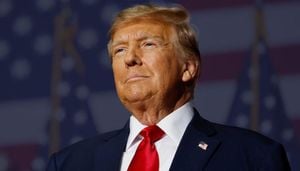Meta, the parent company of Facebook and Instagram, has made headlines recently with its $1 million donation to President-elect Donald Trump's inauguration fund. This move marks another twist in the complex relationship between Big Tech and the former president, particularly following Trump's controversial removal from Facebook amid the fallout of the January 6 Capitol riots.
The announcement, which came just weeks after Meta CEO Mark Zuckerberg held a private meeting with Trump at his Mar-a-Lago estate, indicates Meta's strategy to re-establish ties with the incoming administration. This meeting is seen as part of Zuckerberg's effort to mend fences and become more active in shaping the tech policies of the upcoming Trump administration.
Reports of the donation were first highlighted by The Wall Street Journal, and soon after, it was confirmed by multiple major news outlets including CNN and The New York Times. Trump's inauguration fund is known for attracting corporate donations, which can come without specific contribution limits. Notably, donors contributing at least $1 million are offered incentives such as tickets to inaugural events.
For Zuckerberg and Meta, this donation appears to be more than just financial support; it is also about changing perceptions. Over recent months, Zuckerberg has been seen shifting from viewing Trump almost as adversarial to expressing admiration for him. Just this past summer, during his comments about Trump's near-assassination experience, Zuckerberg referred to Trump as "badass," showcasing his more favorable view.
This transition is happening against the backdrop of Trump's historical actions against Facebook, which he labeled as "an enemy of the people" after being banned from the platform for his role leading to the January 6 insurrection. Trump has criticized social media companies, claiming they suppress conservative voices, yet following his reinstatement on Facebook earlier this year, he reportedly softened his stance on Zuckerberg.
Recent comments from Stephen Miller, who has been named deputy chief of staff for Trump's upcoming term, suggest Zuckerberg's motivations align with many corporate leaders who want to support Trump's economic vision. Miller articulated this sentiment, noting how business leaders desire to bolster American prosperity and maintain the nation’s status as the "most powerful, wealthiest, freest nation on the face of Earth."
Meta is not alone among tech executives looking to establish good relations with the incoming administration. Other prominent tech figures, including Tim Cook of Apple and Sundar Pichai of Google, have also sought dialogue with Trump, especially as he returns to the White House.
It’s worth noting the historical habits of corporate contributions to inaugural funds. Traditionally, these funds have merged finances from corporate giants, with notable examples being past donations from Google and Microsoft. Notably, Facebook did not contribute to either Joe Biden's 2021 inauguration or Trump’s initial inauguration. The fact is, Meta's involvement now raises eyebrows about where corporate politics will intertwine with the incoming administration's policies.
Throughout this election season, Facebook and other platforms used to see reduced political content to limit misinformation, indicating Zuckerberg's strategic shift. Yet, this active engagement with Trump seems contradictory to their prior standoffish approach.
So here we are, witnessing Zuckerberg’s rapprochement with Trump just as the latter gears up for another term, marked by not just political maneuvering but also the quest for cordial relations between Silicon Valley and Washington. For many, this relationship is not only about politics but the very business strategies of tech giants attempting to navigate the choppy waters of public scrutiny and political influence.



